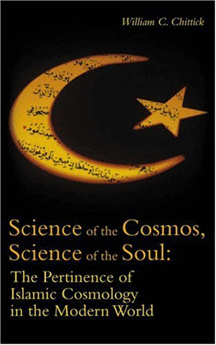
[In a recent and provocatively stimulating book. Bill Chittick examines the relevance of centuries of intellectual pursuit of Islamic cosmology for Muslims in the modern world. This is a fascinating book that is worth reading by Muslims and non-Muslims alike. It is a welcome relief from the constant drumbeat of Islam and politics. Order a copy today… Webshaykh.]
by William C. Chittick
It is commonly imagined that if our ancestors could be brought from the past in a time machine, they would be amazed and dumbfounded by the feats of modern science and civilization. But how would a Muslim intellectual of the past react to the modern world, and in particular to its intellectual ambiance? What would an al-Farabi, or an Avicenna, or a Mulla Sadra think of contemporary science and scholarship?
For the purpose of this experiment, I will borrow the name of our time-traveler from the famous philosophical novel of Ibn Tufayl, Hayy ibn Yaqzan, “Alive, son of Awake.†The name refers to the soul that has been reborn by actualizing the intellect. I will simply call him Ibn Yaqzan.
No doubt Ibn Yaqzan would be astonished by the ready availability of an enormous amount of information. However, he would be much more astonished by the fact that people have no idea that all this information is irrelevant to the goals of human life. He would see that people’s understanding of their true situation has decreased roughly in proportion to the amount of information they have gathered. The more “facts†they know, the less they grasp the significance of the facts and the nature of their own selves and the world around them.
Ibn Yaqzan would be appalled at the loss of any sense of what knowledge is for. People think that they should gain knowledge to control their social and natural environments and to make their physical lives more comfortable. In Ibn Yaqzan’s view, the â€quest for knowledge†that the Prophet made incumbent upon all believers is not, however, a quest for information or a “better life.†Rather, it is a quest to understand the Qur’an and the Hadith, and then, on the basis of that understanding, it is a search for self-knowledge, self-awareness, and the recognition of God’s signs in the universe and the soul. It is a quest for wisdom and mastery of self, not for control and manipulation of the world and society.
Ibn Yaqzan would certainly be struck by the misuse of words like “scientist†and “intellectual.†He would immediately see that people use the word “scientist†to designate possessors of a knowledge that is deemed uniquely true and reliable. He would see, however, that “scientific†knowledge is simply a means for understanding appearances so that they can be manipulated to achieve the desires of human egos. To him, it would seem that what people call “science†is strikingly similar to what in his times was called “sorcery.†Certainly, the goal is exactly the same: to manipulate God’s creation by recourse to means that escape ordinary human abilities for the sake of short-sighted if not demonic goals.
As for the word “intellectual,†he would think that an intellectual is someone who knows God, the world, and the human soul on the basis of realization, not imitation. An intellectual is someone who claims to know only what he has realized for himself, and otherwise quotes the authorities or admits his ignorance. Ibn Yaqzan would see, however, that modern scientists, intellectuals and scholars have acquired all their knowledge by imitation, not realization. They take what they call â€facts†from others, without verifying their truth, and then proceed to build their own theories and practices on the basis of these borrowed facts, producing and endless proliferation of new facts that go back to no firm foundation. Experts in the modern scientific and critical disciplines do not know things as they are, but rather in terms of the consensus of their colleagues, mathematical constructs, theoretical fantasies, and ideological presuppositions.
Ib Yaqzan would think that the modern learned classes imagine that they know all sorts of things, but in fact they know nothing. Verified and realized knowledge carries with it the self-evidence of certainty, but people have no certainty about anything. Since all their information and learning is of the transmitted variety, they do not know for themselves and in themselves…
As for Muslims living in the modern world, he would be dumbfounded that most of them accept the gods and priests just like the non-Muslims. What would perhaps sadden him most, however, is that Muslim parents have lost any sense of how to guide their children on the path to tawhid. They have come to believe that religion means ignorance and superstition, and that studying the Islamic heritage is a total waste of time, since it has been replaced by scientific knowledge. They refuse to allow their children to study religion except when all other avenues of enhancement are barred. medicine, science, engineering, and business administration are the professions of choice, and — in North America at least — law, since lawyers make a lot of money too. So, instead of encouraging their children to seek knowledge of God and his guidance, they insist that they join the priesthoods. The learning that their children gain is still of the transmitted variety, but joining the priesthood of doctors is much more respectable — not to mention lucrative — than becoming a Muslim cleric.
After taking a quick look around, Ibn Yaqzan would no doubt be anxious to return to a world that has preserved some sense of proportion.
Excerpt from William C. Chittick, Science of the Cosmos, Science of the Soul: The Pertinence of Islamic Cosmology in the Modern World (Oxford: Oneworld, 2007), pp. 33-38.